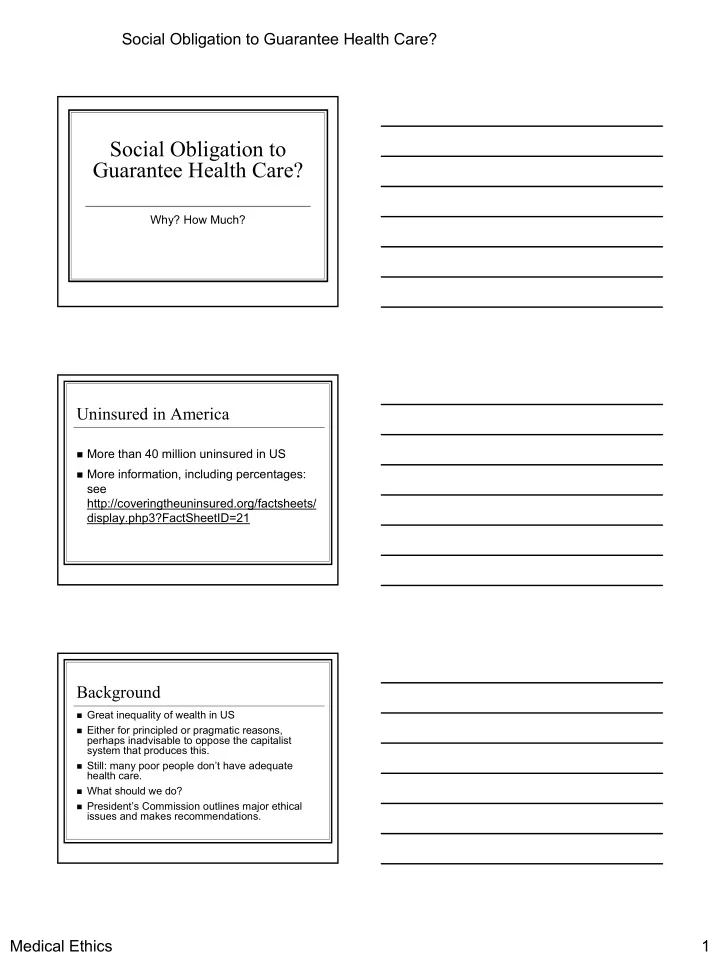

Social Obligation to Guarantee Health Care? Social Obligation to Guarantee Health Care? Why? How Much? Uninsured in America � More than 40 million uninsured in US � More information, including percentages: see http://coveringtheuninsured.org/factsheets/ display.php3?FactSheetID=21 Background � Great inequality of wealth in US � Either for principled or pragmatic reasons, perhaps inadvisable to oppose the capitalist system that produces this. � Still: many poor people don’t have adequate health care. � What should we do? � President’s Commission outlines major ethical issues and makes recommendations. Medical Ethics 1
Social Obligation to Guarantee Health Care? Health Care Is Special Because of its Relation to… � Well being � Avoidance of pain, suffering, disability, death. � Health care a primary good: something we desire regardless of our particular life goals � Opportunity � Information � Existential significance of illness, birth, death Other Factors Making Health Care Special � Need for it is not predictable; can’t easily plan for it � Much of health and illness is beyond individual control: genetics, environment, chance. � Cost of care can be overwhelming (e.g., unpredictable catastrophe from accident) Spirit of Report (contrast with Sade) � “The depth of a society’s concern about health care can be seen as a measure of its sense of solidarity in the face of suffering and death.” � “A society’s commitment to health care reflects some of its most basic attitudes about what it is to be a member of the human community.” (p. 832-2) � We should provide equitable access to health care, but what is “equitable”? Medical Ethics 2
Social Obligation to Guarantee Health Care? Equity is not equality (equality would mean: “whatever one gets, everyone gets”) � If generous, too great a drain on nation’s resources that are needed for other goods. � If restrictive, then would need to restrict economic liberty (recall chart distributed in class) � Wealthy could use their greater wealth for frivolous things but not for better health care for their children . � Is this unjust? Equity is not providing all that would benefit people � Too expensive; must consider costs as well � Cannot even provide all that people “need” because need to hard to define. � Philosophically: important distinction between wants and needs � Can this be formulated in a way to overcome the Pres. Commission’s objection here? Equitable access should provide an adequate level of care � Task: sharpen this vague term into a workable foundation for U.S. health policy � Recognizes that resources are limited; we need to set priorities � Overcomes objection that equitable health care is an “impossible ideal.” � Avoids an unacceptable restriction on economic liberty (e.g., disallowing rich to spend for health care) � This notion is “society-relative. Interesting to consider how we’d define “adequate” in South Africa Medical Ethics 3
Social Obligation to Guarantee Health Care? Other Key Elements � Should impose only “acceptable burdens” on people � Contrasting view (Gutmann): health care so related to human dignity that unequal burden immoral. � The obligation is provide equitable health care belongs to society � This is a public, communal responsibility � Contrast with Sade. Why is health care not a private responsibility? � Cannot be provided by individuals’ own efforts � Unpredictable and great costs � Undeserved (generally) (Above repeat earlier points. But also, not explicitly stated but important—EB): � Medical knowledge has been acquired with public funds, so doctors’ skill is not their private property. (“a social product requiring the skills and efforts of many individuals”) What Is the Role of Government ? � A social responsibility, but not necessarily only government: a “pluralistic approach of public and private.” � The ultimate responsibility for health care rests with the Federal Government. (Doesn’t mean government should be provider) Medical Ethics 4
Social Obligation to Guarantee Health Care? Is There a RIGHT to health care � Back to Ethics 101: every right implies an obligation but not every obligation implies a right. (Can you explain this clearly?) � Commission couldn’t decide the philosophical question whether people are entitled to health care (and how right relates to other rights). � Simply: social obligation to provide equitable access to health care. How much care is “adequate”? � Next week: managed care, age-based restrictions and other specific “tests” � Clear cases: cosmetic surgery need not be included � Key question: how does the health care relate to welfare, opportunity, information, and interpersonal caring—the things that made health care “special.” � Mental health coverage? Must Consider Costs � Cost-benefit analysis to determine what health care offered, what not. � Costs and benefits must be conceived broadly: � Benefits need not be monetarily quantifiable; includes improved quality of life, reassurance from information, social benefit of strengthening a sense of community � Costs include diverting funds from other possible non- medical goods. Medical Ethics 5
Social Obligation to Guarantee Health Care? Defining “adequate” level � Does not mean the highest possible level of quality. So there may be an expensive treatment that will provide best care that will have to be denied. � Outcomes research has become increasingly important (EB) Pres. Commission: how it should be Reinhardt: the way it is falls far short � Clearly starts from opposite premises from Sade. � As national policy, should child of a poor family have same chance of avoiding preventable illness as rich family? � Reinhardt: in US answer is no; most other industrialized countries have said yes. � Is this true? � Would Pres Comm. Report say yes or no? Reinhardt: American Health Care System Unfairly Favors Rich � True that generous care for unproductive frail people compromises a nation’s long- term material wealth. � Powerful elite in US have favored material wealth at expense of poor. � Rawlsian position would dictate otherwise. Medical Ethics 6
Recommend
More recommend